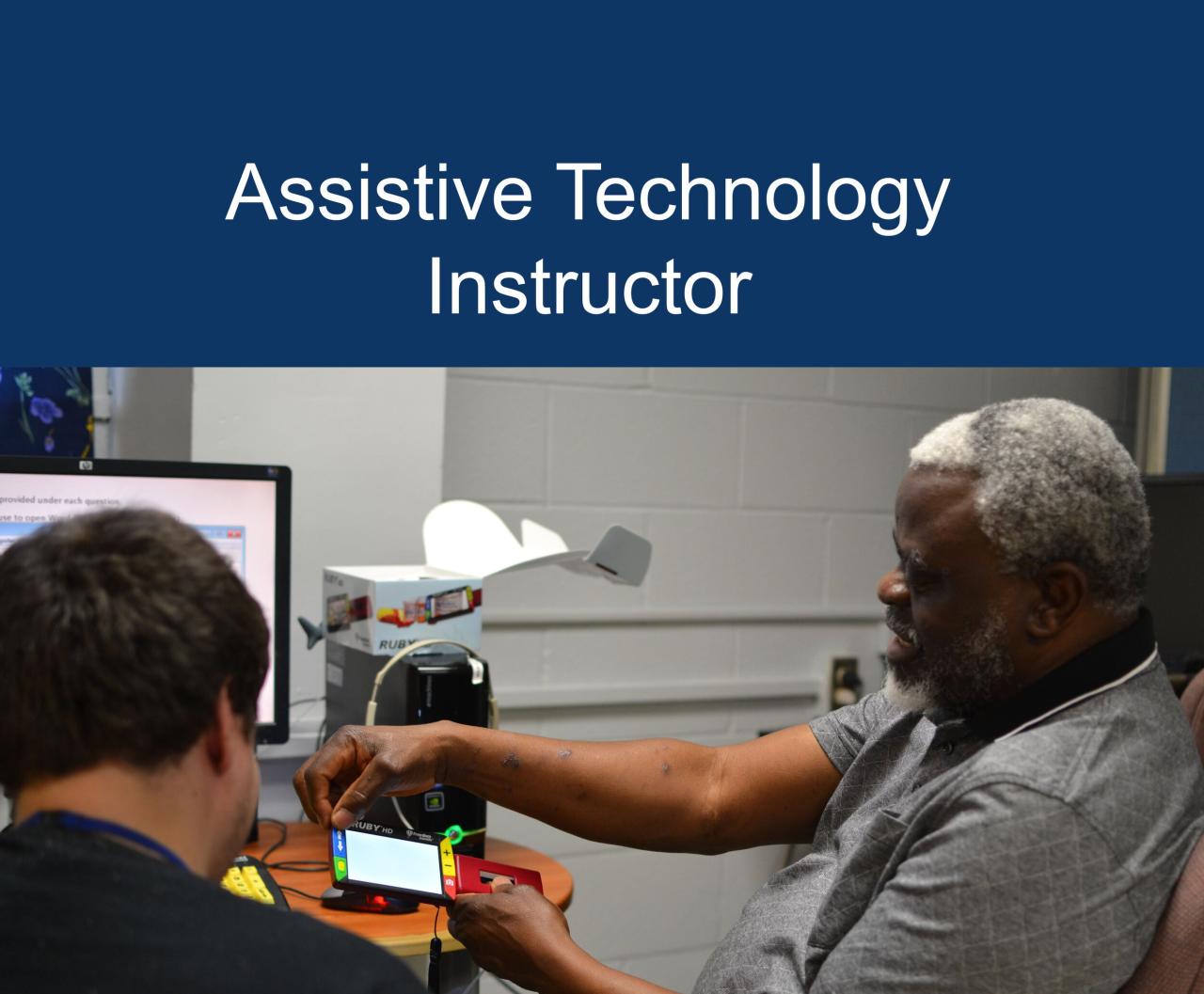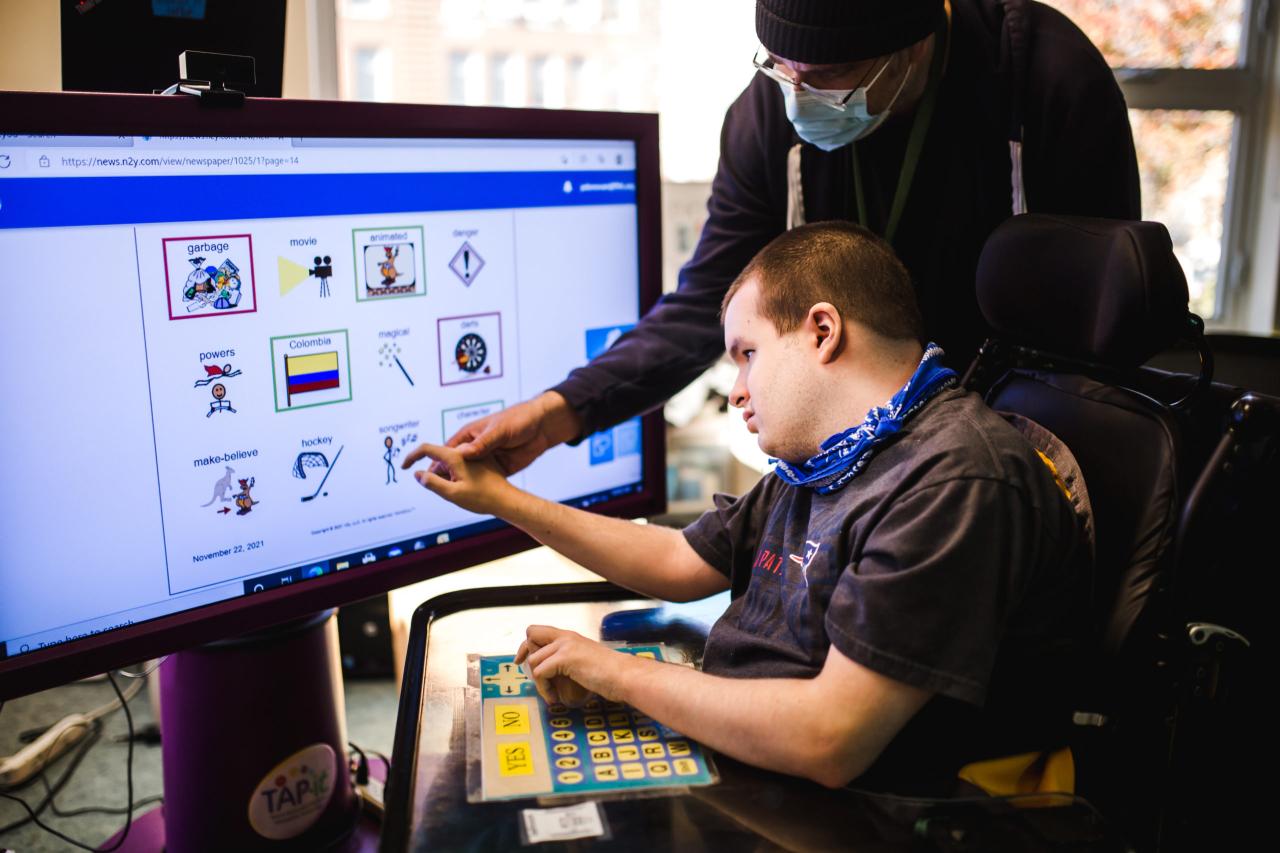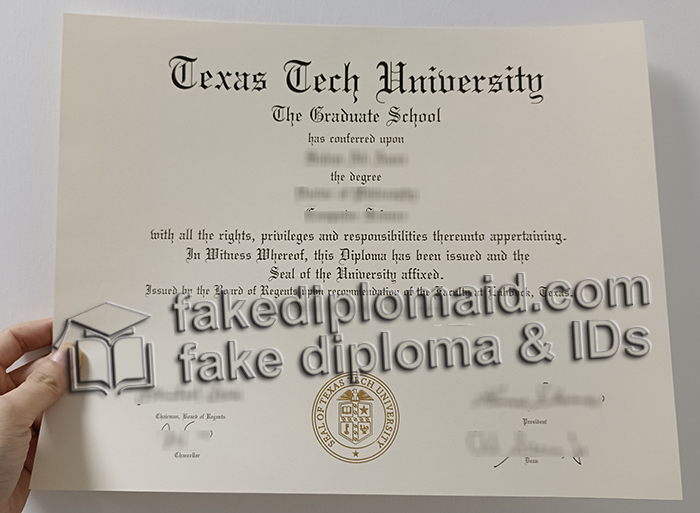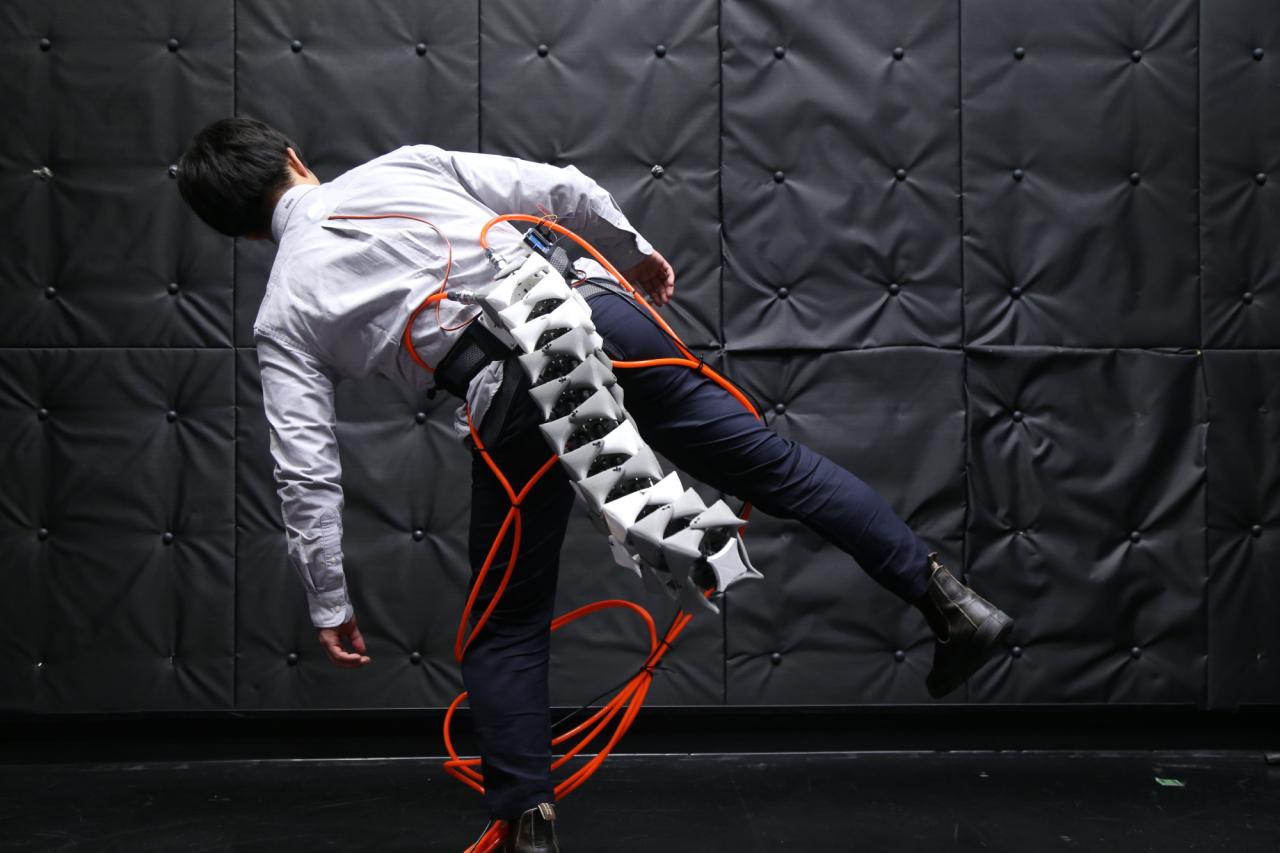Assistive Technology Specialist Education: Empowering Individuals
Assistive technology specialist education equips individuals with the knowledge and skills to empower people with disabilities. This field encompasses a wide range of technologies, from simple adaptive devices to complex […]

Assistive technology specialist education equips individuals with the knowledge and skills to empower people with disabilities. This field encompasses a wide range of technologies, from simple adaptive devices to complex software systems, all aimed at promoting independence and inclusion.
From schools and hospitals to rehabilitation centers and community organizations, assistive technology specialists play a vital role in assessing individual needs, recommending appropriate solutions, and providing training and support. They bridge the gap between technology and human potential, helping individuals achieve their goals and live fulfilling lives.
The Role of an Assistive Technology Specialist

Assistive technology (AT) specialists play a crucial role in empowering individuals with disabilities to participate fully in all aspects of life. They bridge the gap between individuals’ needs and the technology available to meet those needs.
Primary Responsibilities of an Assistive Technology Specialist
AT specialists are responsible for conducting comprehensive assessments to identify an individual’s needs and goals. They then evaluate and recommend appropriate assistive technology solutions. This process involves considering factors such as the individual’s abilities, limitations, lifestyle, and environment.
- Conducting assessments to identify an individual’s needs and goals.
- Evaluating and recommending appropriate assistive technology solutions.
- Providing training and support to individuals and their families on how to use the assistive technology.
- Collaborating with other professionals, such as teachers, therapists, and physicians.
- Staying up-to-date on the latest assistive technology advancements and trends.
- Advocating for individuals with disabilities and promoting accessibility.
Diverse Settings Where Assistive Technology Specialists Work
AT specialists work in a variety of settings, including:
- Schools: AT specialists in schools help students with disabilities access their education. They work with teachers and parents to ensure that students have the necessary accommodations and supports.
- Hospitals: AT specialists in hospitals assist patients with disabilities in regaining their independence and improving their quality of life. They work with physicians and therapists to recommend assistive technology solutions that can help patients perform daily tasks.
- Rehabilitation Centers: AT specialists in rehabilitation centers help individuals with disabilities to regain their functional abilities. They work with therapists and other professionals to develop personalized assistive technology plans.
- Private Practice: Some AT specialists work independently, providing consulting services to individuals, families, and organizations.
Ethical Considerations and Professional Standards
AT specialists are guided by a strong set of ethical considerations and professional standards. These principles ensure that individuals with disabilities are treated with respect and dignity, and that their rights are protected.
- Confidentiality: AT specialists must maintain the confidentiality of their clients’ information.
- Competence: AT specialists must practice within their area of expertise and continue their professional development to stay up-to-date on the latest advancements.
- Objectivity: AT specialists must recommend assistive technology solutions based on the individual’s needs, not on personal biases or preferences.
- Advocacy: AT specialists must advocate for their clients’ rights and ensure that they have access to the resources they need.
“Assistive technology specialists play a vital role in empowering individuals with disabilities to live full and meaningful lives.”
Educational Pathways for Assistive Technology Specialists: Assistive Technology Specialist Education
Becoming an assistive technology specialist typically requires a combination of education and experience. Individuals interested in this field can pursue a variety of educational programs, each offering a unique set of skills and knowledge.
Types of Educational Programs
The educational pathways for assistive technology specialists can vary widely, ranging from associate’s degrees to doctoral programs. Here are some common options:
- Associate’s Degree in Assistive Technology: This program provides a foundational understanding of assistive technology principles, devices, and applications. It prepares graduates for entry-level positions in assistive technology service delivery, such as assistive technology technician or assistant.
- Bachelor’s Degree in Assistive Technology: This degree program offers a more comprehensive curriculum, covering topics such as assistive technology assessment, intervention, and evaluation. Graduates may work as assistive technology specialists, consultants, or educators.
- Master’s Degree in Assistive Technology: A master’s degree in assistive technology provides advanced knowledge and skills in research, policy, and leadership. Graduates can pursue careers as researchers, program developers, or administrators in the field.
- Doctorate in Assistive Technology: This degree is designed for individuals who want to conduct research and contribute to the advancement of assistive technology. Graduates typically work as professors, researchers, or policy experts.
Curriculum Comparison
The curriculum of assistive technology programs varies depending on the level of education and the specific institution. However, common core topics include:
- Assistive Technology Principles and Concepts: This course introduces the fundamental principles of assistive technology, including its history, definitions, and ethical considerations.
- Assistive Technology Assessment and Evaluation: This course focuses on the process of identifying individual needs, selecting appropriate assistive technology devices, and evaluating their effectiveness.
- Assistive Technology for Specific Disabilities: This course explores the use of assistive technology for individuals with specific disabilities, such as visual impairments, hearing loss, or physical limitations.
- Assistive Technology Devices and Applications: This course provides an overview of different types of assistive technology devices, including their features, benefits, and limitations.
- Assistive Technology Policy and Advocacy: This course examines the legal and policy framework surrounding assistive technology, including legislation, funding, and accessibility standards.
- Assistive Technology Service Delivery: This course focuses on the practical aspects of providing assistive technology services, including assessment, training, and support.
Certifications and Licenses
While not always required, certifications and licenses can enhance the credibility and marketability of assistive technology specialists. Some common certifications include:
- Assistive Technology Professional (ATP): This certification is offered by the RESNA (Rehabilitation Engineering & Assistive Technology Society of North America) and demonstrates competency in assistive technology assessment, intervention, and evaluation.
- Certified Assistive Technology Specialist (CATS): This certification is offered by the International Society for Technology in Education (ISTE) and focuses on the use of assistive technology in educational settings.
- Certified Assistive Technology Practitioner (CATP): This certification is offered by the Assistive Technology Industry Association (ATIA) and recognizes individuals who have demonstrated knowledge and skills in assistive technology.
Core Skills and Knowledge for Assistive Technology Specialists
Assistive technology specialists play a crucial role in empowering individuals with disabilities by providing them with the tools and support they need to participate fully in all aspects of life. To effectively fulfill this role, they must possess a comprehensive set of skills and knowledge. This section will explore the essential areas of expertise that form the foundation of their practice.
Assessment and Evaluation Techniques
A thorough understanding of assessment and evaluation techniques is essential for assistive technology specialists. These techniques enable them to accurately identify an individual’s needs and determine the most appropriate assistive technology solutions. This process involves gathering information about the individual’s strengths, weaknesses, functional limitations, and goals.
- Functional Assessment: This involves observing an individual’s performance in various tasks and activities to identify their functional limitations and areas where assistive technology can be helpful. For example, an assistive technology specialist might observe a student’s writing skills to assess their ability to complete assignments.
- Needs Assessment: This involves gathering information about the individual’s specific needs and goals. This can be done through interviews with the individual, family members, and other professionals. For instance, an assistive technology specialist might interview a person with a visual impairment to understand their daily living needs and their desired level of independence.
- Technology Assessment: This involves evaluating the suitability and effectiveness of various assistive technology devices and software for the individual’s specific needs. The specialist considers factors such as the individual’s cognitive abilities, physical limitations, and the environment in which the technology will be used. For example, an assistive technology specialist might evaluate different types of screen readers to find the one that best meets the needs of a person with a visual impairment.
Understanding of Assistive Technology Devices and Software
Assistive technology specialists must possess a deep understanding of the wide range of assistive technology devices and software available. This includes knowledge of their features, capabilities, limitations, and compatibility with different operating systems and platforms.
- Adaptive Hardware: This includes devices such as wheelchairs, mobility aids, augmentative and alternative communication (AAC) devices, and environmental control systems. For example, an assistive technology specialist should be familiar with the different types of wheelchairs available and their suitability for various disabilities.
- Adaptive Software: This includes software applications that provide accessibility features, such as screen readers, text-to-speech software, speech recognition software, and alternative input methods. For instance, an assistive technology specialist should be knowledgeable about the different types of screen readers available and their strengths and weaknesses.
Adaptive Strategies for Various Disabilities
Assistive technology specialists must be able to develop and implement adaptive strategies for individuals with various disabilities. This requires an understanding of the unique challenges faced by individuals with different disabilities and the assistive technology solutions that can address these challenges.
- Physical Disabilities: Specialists need to be familiar with assistive technology solutions for individuals with physical disabilities, such as mobility aids, adaptive equipment for daily living tasks, and assistive technology for communication. For example, they might recommend a specialized keyboard for a person with limited hand dexterity or a voice-activated computer for someone with limited mobility.
- Cognitive Disabilities: Specialists should understand assistive technology solutions for individuals with cognitive disabilities, such as memory aids, organizational tools, and software for learning and cognitive skills development. For example, they might recommend a visual timer for a person with ADHD or a task management app for someone with memory difficulties.
- Sensory Disabilities: Specialists need to be knowledgeable about assistive technology solutions for individuals with sensory disabilities, such as visual aids, auditory aids, and tactile aids. For example, they might recommend a magnifier for a person with low vision or a vibrating alarm clock for someone with a hearing impairment.
Collaboration with Individuals, Families, and Other Professionals, Assistive technology specialist education
Assistive technology specialists work in a collaborative environment, partnering with individuals, families, and other professionals to ensure that assistive technology solutions are effective and meet the needs of the individual.
- Individualized Assessment and Intervention: Specialists work closely with individuals to understand their needs, goals, and preferences. This involves conducting assessments, developing individualized intervention plans, and providing training and support to ensure that the individual can effectively use the assistive technology.
- Family Involvement: Specialists engage with families to provide information about assistive technology options, discuss the individual’s needs, and address any concerns. This collaborative approach ensures that the family is involved in the decision-making process and that the assistive technology solution is integrated into the individual’s home and family life.
- Interprofessional Collaboration: Specialists collaborate with other professionals, such as teachers, therapists, physicians, and social workers, to ensure that the assistive technology solution is integrated into the individual’s overall care plan. This team approach ensures that the individual receives comprehensive and coordinated support.
Ongoing Professional Development
The field of assistive technology is constantly evolving, with new devices and software emerging regularly. To remain current and provide the best possible services, assistive technology specialists must engage in ongoing professional development.
“Ongoing professional development is essential for assistive technology specialists to stay abreast of the latest advancements in technology and best practices in the field.”
- Continuing Education Courses: Assistive technology specialists can attend continuing education courses to learn about new technologies, assessment techniques, and intervention strategies. These courses are often offered by professional organizations, universities, and technology companies.
- Professional Conferences and Workshops: Attending conferences and workshops provides an opportunity to network with other professionals, learn about emerging trends, and hear presentations by leading experts in the field.
- Reading Professional Journals and Publications: Staying up-to-date with the latest research and best practices in the field can be achieved by reading professional journals and publications related to assistive technology.
The Impact of Assistive Technology on Individuals and Society
Assistive technology (AT) plays a transformative role in empowering individuals with disabilities, enabling them to participate more fully in all aspects of life. By bridging the gap between ability and participation, AT fosters greater independence, inclusion, and overall well-being.
Empowering Individuals with Disabilities
AT empowers individuals with disabilities by providing them with the tools and resources necessary to overcome challenges and achieve their goals. These tools can range from simple adaptations to complex technologies, each tailored to address specific needs and enhance capabilities.
- Increased Independence: AT devices, such as wheelchairs, hearing aids, and screen readers, allow individuals to perform tasks independently, reducing reliance on others and fostering a sense of control over their lives.
- Improved Communication: Assistive communication devices, including augmentative and alternative communication (AAC) systems, enable individuals with speech impairments to express themselves effectively, enhancing social interaction and participation.
- Enhanced Learning: AT tools like text-to-speech software, visual aids, and specialized learning platforms provide individuals with disabilities with equal access to education, enabling them to learn at their own pace and achieve academic success.
- Greater Employment Opportunities: AT can facilitate employment by providing individuals with disabilities with the necessary accommodations to perform their job duties effectively, promoting inclusivity and diversity in the workplace.
Emerging Trends in Assistive Technology

The field of assistive technology is constantly evolving, driven by rapid advancements in technology and a growing understanding of human needs. These advancements are transforming how individuals with disabilities interact with the world, promoting greater independence, inclusion, and participation in all aspects of life.
The Role of Technology in Promoting Accessibility and Inclusion
Technology plays a crucial role in promoting accessibility and inclusion for individuals with disabilities. Assistive technologies bridge the gap between individuals and their environment, enabling them to overcome barriers and participate fully in society.
- Universal Design: Designing products and environments that are accessible to all, regardless of ability, is a key principle in promoting inclusion. This approach considers the needs of diverse users, ensuring that technology is usable by everyone.
- Adaptive Technology: Assistive technologies specifically designed to address the unique needs of individuals with disabilities are known as adaptive technologies. These technologies can range from simple modifications to complex systems, empowering individuals to perform tasks they might otherwise find challenging.
- Assistive Technology in Education: Assistive technology plays a vital role in education, enabling students with disabilities to access learning materials, participate in classroom activities, and achieve their full potential. Examples include screen readers, speech-to-text software, and adaptive keyboards.
- Assistive Technology in Employment: Assistive technology can help individuals with disabilities overcome barriers to employment, enabling them to perform their jobs effectively and contribute to the workforce. Examples include voice recognition software, ergonomic equipment, and assistive devices for mobility.
Future Directions in Assistive Technology Specialist Education
The field of assistive technology is constantly evolving, driven by rapid advancements in technology and a growing understanding of human needs. This evolution necessitates a dynamic approach to the education of assistive technology specialists, ensuring they are equipped with the skills and knowledge to effectively serve individuals with disabilities.
Adapting to Evolving Technological Advancements
Educational programs for assistive technology specialists must adapt to the ever-changing landscape of technology. This includes incorporating new technologies, such as artificial intelligence, virtual reality, and wearable devices, into the curriculum.
- Integration of Emerging Technologies: Curricula should be designed to incorporate emerging technologies into the learning process. This could involve hands-on experience with new assistive devices, training in the use of AI-powered tools for assessment and intervention, and exploring the potential of VR for rehabilitation and skill development.
- Developing Digital Literacy Skills: Educational programs should emphasize digital literacy skills, including data analysis, cybersecurity, and ethical considerations related to assistive technology. This ensures specialists are prepared to navigate the complex digital environment and leverage technology effectively.
- Lifelong Learning: Given the rapid pace of change in the field, educational programs should foster a culture of lifelong learning. This can be achieved through ongoing professional development opportunities, online courses, and mentorship programs.
Developing Innovative Training Programs
To address the evolving needs of the field, innovative training programs are essential. This involves exploring new pedagogical approaches, incorporating diverse learning modalities, and fostering collaborative learning environments.
- Blended Learning Approaches: Integrating online learning platforms with in-person workshops and practicum experiences can provide a more flexible and engaging learning environment. This approach allows students to learn at their own pace and access a wider range of resources.
- Simulation-Based Training: Utilizing simulations and virtual reality environments can provide students with realistic scenarios for practicing their skills and developing critical thinking abilities. This approach is particularly useful for training in areas such as assistive technology assessment and intervention.
- Collaborative Learning Environments: Encouraging collaboration among students, faculty, and industry professionals fosters a dynamic learning environment. This can be achieved through peer-to-peer learning, group projects, and mentorship programs.
Fostering Research and Collaboration
Research and collaboration are crucial for advancing the field of assistive technology and informing the development of effective educational programs.
- Supporting Research: Educational programs should encourage and support student and faculty research in assistive technology. This can involve providing resources for research projects, facilitating collaborations with industry partners, and disseminating research findings through publications and presentations.
- Promoting Interdisciplinary Collaboration: Collaboration between assistive technology specialists, educators, engineers, and other professionals from related fields can lead to innovative solutions and advancements in the field. This can be facilitated through joint research projects, conferences, and workshops.
- Building Partnerships: Establishing partnerships with industry organizations, government agencies, and non-profit organizations can provide access to valuable resources, funding opportunities, and real-world experiences for students and faculty.
Final Wrap-Up
The field of assistive technology is constantly evolving, driven by advancements in technology and a growing understanding of human capabilities. As technology becomes more sophisticated, assistive technology specialists are at the forefront of innovation, shaping the future of accessibility and inclusion. Their work is not only about enabling individuals but also about creating a more equitable and inclusive society for all.
Assistive technology specialist education is crucial for empowering individuals with disabilities, and it often involves learning about a wide range of technologies. One emerging area that could benefit assistive technology specialists is the emerging technology apprenticeship program , which offers training in cutting-edge technologies like artificial intelligence and robotics.
By integrating these new technologies into their skillset, assistive technology specialists can potentially create even more innovative and impactful solutions for their clients.










